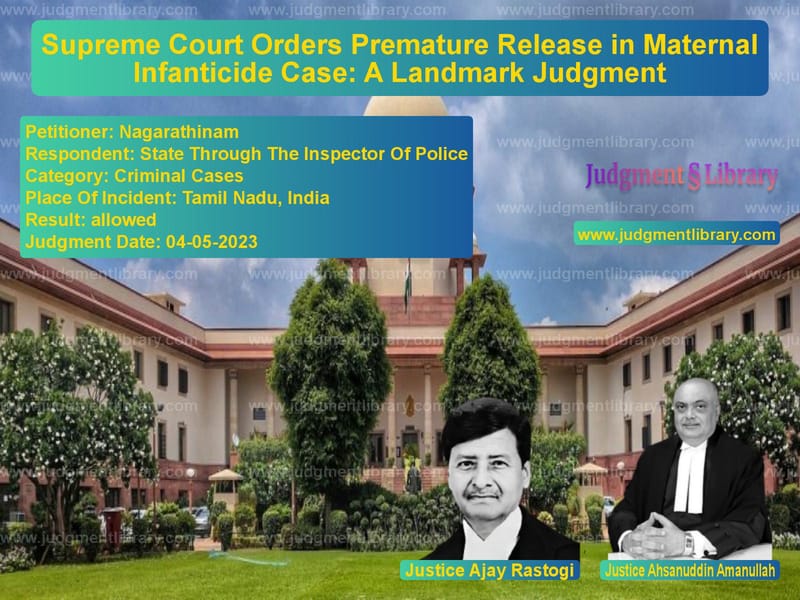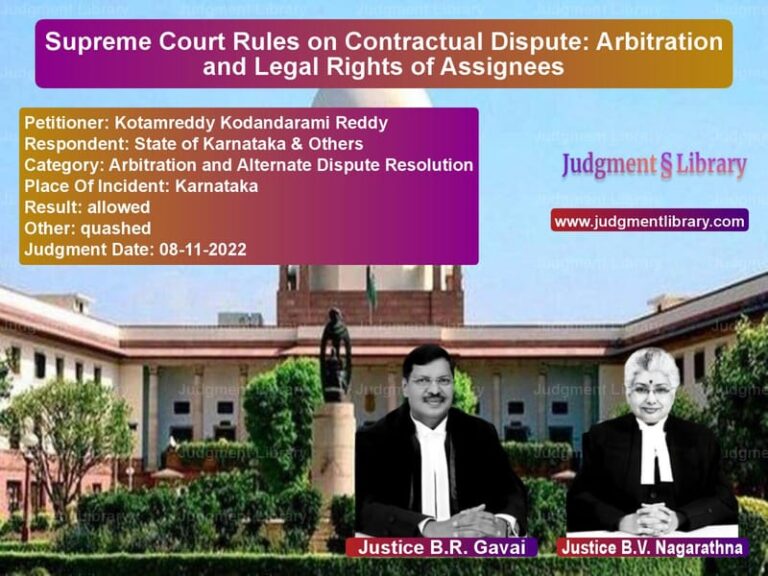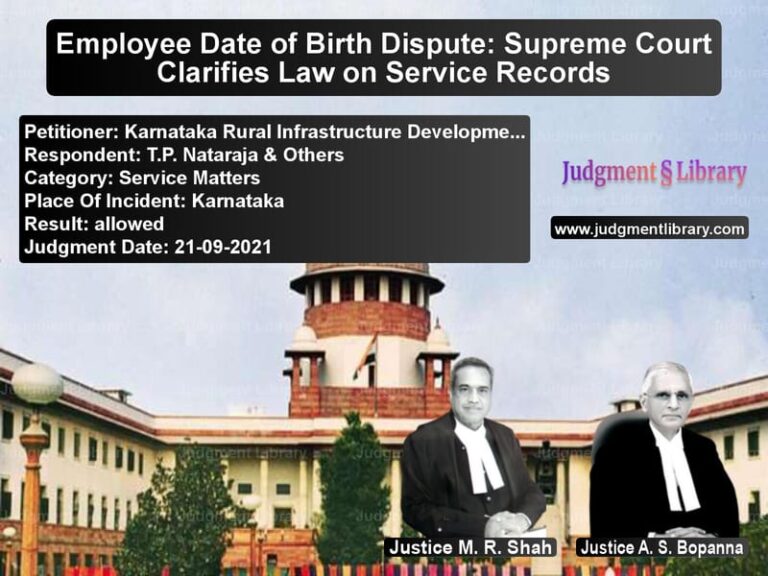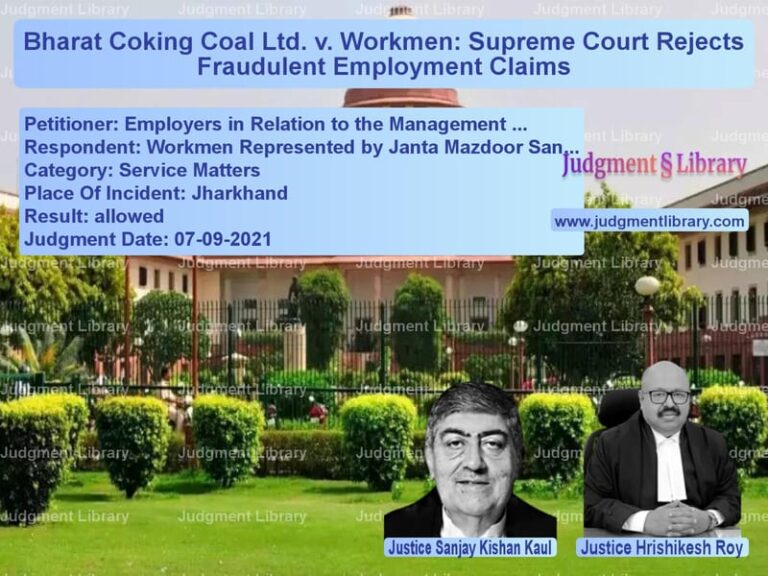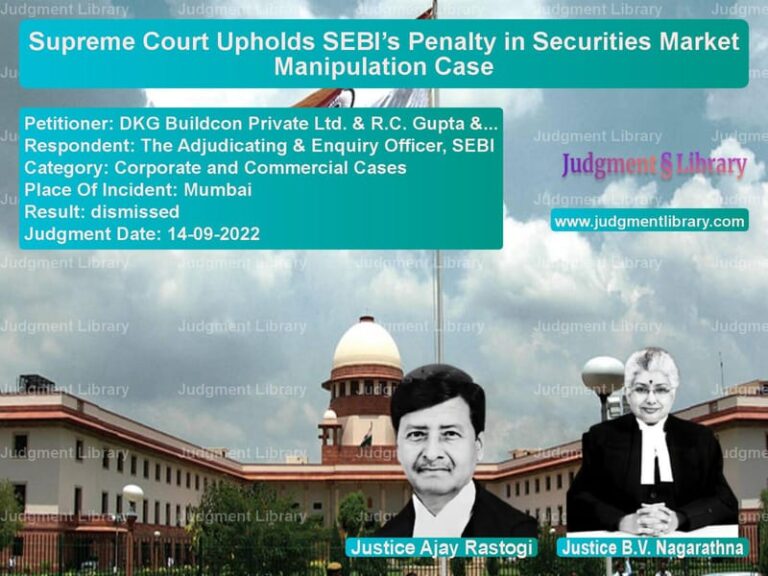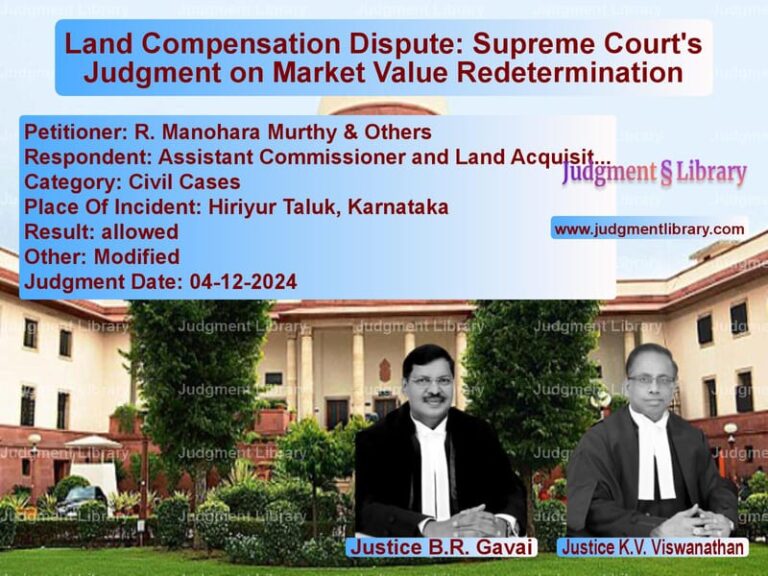Supreme Court Orders Premature Release in Maternal Infanticide Case: A Landmark Judgment
The case of Nagarathinam vs. State Through The Inspector Of Police is a tragic and legally complex matter involving a mother convicted for the death of her two children. The Supreme Court of India was tasked with reviewing the conviction under Section 302 of the IPC and determining whether her case merited premature release after nearly 20 years in prison.
The case involved deeply distressing facts. The appellant, Nagarathinam, attempted suicide along with her two young children due to alleged threats and distress caused by her partner. She administered poison to her children, intending to die alongside them. However, while she was prevented from consuming poison, her children did not survive.
Background of the Case
The events leading to this case date back to 2003, when Nagarathinam was arrested and charged with the murder of her two children under Section 302 of the IPC. She was convicted by the Trial Court and sentenced to life imprisonment. Additionally, she was charged under Section 309 of the IPC (attempt to commit suicide) and sentenced to one year of simple imprisonment.
Upon appeal, the Madras High Court acquitted her under Section 309 but upheld her life sentence under Section 302. After spending nearly 20 years in prison, she applied for premature release, which was recommended by the State Level Committee but was rejected by the Tamil Nadu Government on the grounds that her offense was cruel and brutal.
Arguments Presented
Arguments by the Petitioner (Nagarathinam)
- The petitioner’s counsel argued that her actions were not premeditated murder but a consequence of severe mental distress caused by harassment from her partner.
- It was contended that the case fell under Exception 1 to Section 300 IPC, which recognizes homicide committed under grave and sudden provocation as not amounting to murder.
- The defense relied on precedents such as Guruswami Pillai v. State and Suyambukkani v. State, where courts have held that cases of parental suicide attempts involving children can be considered under Section 304 Part I of the IPC.
- It was argued that she had already served two decades in prison and was recommended for release by the State Level Committee due to her good conduct and long incarceration.
Arguments by the Respondent (State of Tamil Nadu)
- The State opposed the plea for premature release, arguing that the crime was cruel and brutal as it involved the poisoning of two young children.
- The State contended that the conviction under Section 302 IPC was upheld by both the Trial Court and the High Court, and no legal ground justified modifying the sentence.
- It was argued that the rejection of her premature release was justified given the gravity of the offense.
Supreme Court’s Observations
The Supreme Court carefully analyzed the facts and legal issues surrounding the case. The judgment provided detailed reasoning on why the offense did not fall under Section 304 IPC.
- “The circumstances in which the Appellant is said to have administered poison to her two sons is clearly reflective of her being under a state of tremendous mental stress. However, despite the best efforts of learned senior counsel for the Appellant, it is difficult to grant the benefit of bringing the case under the ambit of culpable homicide not amounting to murder.”
- The Court reviewed the exceptions to Section 300 IPC but found that the petitioner’s actions did not fall within those exceptions.
- The Court also noted that while previous cases such as Guruswami Pillai and Suyambukkani involved similar circumstances, the factual differences were significant enough to deny the petitioner the same benefit.
- On the issue of premature release, the Court observed that the State’s reasoning for rejecting her release was flawed.
- “The appellant never tried to murder her sons with a view to continue her illicit relationship. On the contrary, she had tried to commit suicide herself along with her children not with a view to continue her illicit relationship with her paramour but rather, in disappointment and frustration over the quarrel picked up by her paramour.”
- The Court emphasized that she had already suffered severe emotional distress and had served nearly 20 years in prison.
Final Judgment
The Supreme Court ruled in favor of the appellant’s premature release, stating:
- The Tamil Nadu Government’s rejection of premature release was arbitrary and lacked valid reasoning.
- The appellant’s conduct in prison was undisputedly good, and she had already served a long period of incarceration.
- The recommendation of the State Level Committee for her release should have been accepted.
- The Court directed that the appellant be released forthwith.
Key Takeaways from the Judgment
- This judgment underscores the significance of mental distress as a factor in criminal liability.
- It clarifies that procedural fairness must be maintained in decisions regarding premature release.
- The ruling affirms that executive decisions rejecting premature release must be supported by sound reasoning and not arbitrary classifications of an offense as “cruel and brutal.”
- The judgment highlights that long periods of incarceration and good conduct should be considered in favor of premature release.
This landmark decision reaffirms the need for humane considerations in criminal justice and reinforces the principle that punishment must not be disproportionate to the circumstances surrounding an offense.
Petitioner Name: Nagarathinam.Respondent Name: State Through The Inspector Of Police.Judgment By: Justice Ajay Rastogi, Justice Ahsanuddin Amanullah.Place Of Incident: Tamil Nadu, India.Judgment Date: 04-05-2023.
Don’t miss out on the full details! Download the complete judgment in PDF format below and gain valuable insights instantly!
Download Judgment: nagarathinam-vs-state-through-the-in-supreme-court-of-india-judgment-dated-04-05-2023.pdf
Directly Download Judgment: Directly download this Judgment
See all petitions in Bail and Anticipatory Bail
See all petitions in Suicide Cases
See all petitions in Judgment by Ajay Rastogi
See all petitions in Judgment by Ahsanuddin Amanullah
See all petitions in allowed
See all petitions in supreme court of India judgments May 2023
See all petitions in 2023 judgments
See all posts in Criminal Cases Category
See all allowed petitions in Criminal Cases Category
See all Dismissed petitions in Criminal Cases Category
See all partially allowed petitions in Criminal Cases Category

